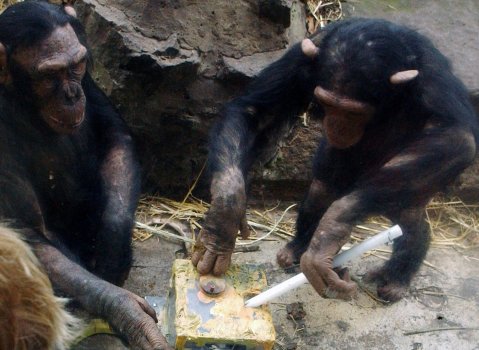Chimps learn ‘local customs’
Chimpanzee communities can acquire their own local customs and maintain their own ‘multiple-tradition cultures’, according to researchers at the University of St Andrews.

The international study led by primatologists at St Andrews found that ‘cultured’ chimps have the ability to pass on novel traditions to members of their own group as well as neighbouring communities.
The researchers tested the theory that behaviours such as foraging habits are passed on by observation and learning by introducing novel forms of behaviour into different chimpanzee communities.
They found that, after a period of time, unique cultures developed within different communities and new traditions spread from one group to another. The study demonstrates that chimpanzees, like people, can readily acquire new traditions, and those newly instituted ‘cultural practices’ can spread to other groups.
Andrew Whiten, a Professor of Evolutionary and Developmental Psychology at St Andrews, explained,
“What makes any two human cultures different? Usually the answer will lie in a set of traditional practices that set them apart. We have robust evidence that in chimpanzees there is a considerable capacity for cultural spread of innovations.
“We have shown that chimpanzees can sustain cultures that are made up of several traditions. This is consistent with what is seen in the wild, where chimpanzees are thought to show up to 20 traditions that define their unique local culture.”
It was in 1999 that an international collaboration led by St Andrews researchers suggested that chimpanzees lead a rich cultural life with different traditions unique to each community. Documented examples of behavioural differences among chimpanzees in the wild include various types of tool use, including hammers and pestles; social behaviours such as overhead hand-clasping during mutual grooming; courtship rituals involving leaves being noisily clipped with the teeth; and methods for eradicating parasites by either stabbing or squashing them.
While this discovery suggests that local cultures exist in different communities of chimpanzees across Africa, it has proved difficult to demonstrate that behaviours are passed on by observation and learning, as opposed to genetics or other environmental factors.
To answer the question, Professor Whiten and St Andrews colleague Antoine Spiteri collaborated with an international team from Yerkes National Primate Research Centre and the University of Texas. They tackled the problem by ‘seeding’ novel forms of tool use and food extraction in chimpanzee communities at Yerkes and Texas. Over time, the researchers saw ten of these new behaviours spread and become full-fledged, local ‘traditions’. As a result, the communities at Yerkes and the University of Texas now display their own unique cultures.
Furthermore, at the University of Texas, where several groups are next-door neighbours within sight of each other, four of the new traditions were passed on – the newly-learned foraging practices spread from one group to another, and then onto a third.
The findings have important implications for understanding the ability of primates to adapt over time.
“Our study proves that chimpanzees have the capacity to sustain the kinds of ‘multiple-tradition cultures’ that field researchers believe exist in Africa, suggesting in turn that our common ancestor of 5-6 million years ago already had this level of cultural complexity.
“Social learning is important for evolutionary adaptation because it can be so much faster than that which occurs through genetic change; and, unlike learning by one¿s own efforts – for example, by trial and error – it can be very efficient because one is standing on the shoulders of what previous generations achieved,” Professor Whiten concluded.
The research, which was supported by the Biotechnology and Biological Sciences Research Council (BBSRC) and the Royal Society, is to be published by Current Biology online today.
ENDS
NOTE TO EDITORS:
THE FOLLOWING RESEARCHERS ARE AVAILABLE FOR INTERVIEW:
Antoine Spiteri, St Andrews – 07908 853 380, [email protected]
Andrew Whiten, St Andrews – 01334 462073 (NB from 8th June)
Frans de Waal, Atlanta – 001 404 727 3695 / 7898, [email protected]
NOTE TO PICTURE EDITORS:
IMAGES ARE AVAILABLE FROM THE PRESS OFFICE – CONTACTS BELOW. PLEASE CREDIT LEWIS HOUGHTON.
Picture Caption: Chimpanzees at Edinburgh Zoo working on a version of one of the tool-using problems included in the new studies during UK Science Week.
Issued by Press Office, University of St Andrews
Contact Gayle Cook, Press Officer on 01334 467227 / 462529, mobile 07900 050 103, or email [email protected]
Ref: CHIMPS LEARN LOCAL CUSTOMS 070607
View the latest University press releases at www.st-andrews.ac.uk
Category Research